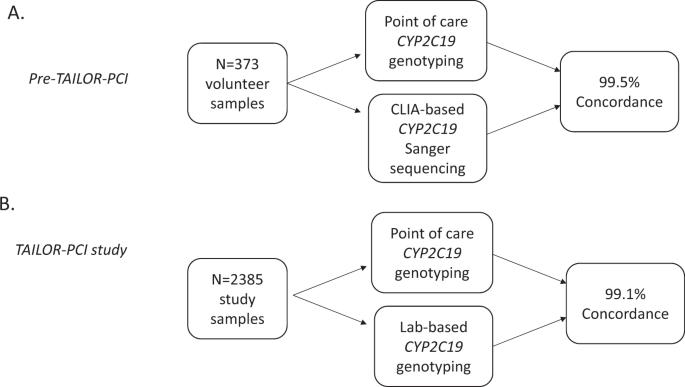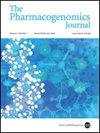经皮冠状动脉介入治疗后的护理点 CYP2C19 基因分型
IF 2.9
3区 医学
Q2 GENETICS & HEREDITY
引用次数: 2
摘要
功能缺失的 CYP2C19 变异与累积性缺血性结果的增加有关,因此在使用氯吡格雷之前需要进行 CYP2C19 基因分型。TAILOR-PCI是一项国际多中心(40个研究点)前瞻性随机试验,比较了快速护理点(POC)基因型指导与传统抗血小板疗法。在 TAILOR-PCI 中,对非实验室培训人员进行的基于口腔的快速 CYP2C19 基因分型的性能进行了评估。试验前培训和评估包括对 373 份口腔样本进行快速基因分型,与 Sanger 测序的吻合率为 99.5%(371/373)。在TAILOR-PCI期间,5302名接受PCI的患者随机接受了POC快速CYP2C19 *2、*3和*17基因分型与不进行基因分型。PCI术后12个月时,TaqMan基因分型与POC结果的一致性为99.1%(2364/2385),灵敏度为90.7-98.8%,特异性为99.2-99.6%。总之,多个国际中心都能成功培训非实验室人员进行现场仪器操作和 POC 快速基因分型,并保证分析的准确性和精确性,从而为心导管实验室等患者护理场所的 POC 基因分型提供支持。临床试验注册:https://www.clinicalTrials.gov(标识符:NCT01742117)。本文章由计算机程序翻译,如有差异,请以英文原文为准。

Point of care CYP2C19 genotyping after percutaneous coronary intervention
Loss-of-function CYP2C19 variants are associated with increased cumulative ischemic outcomes warranting CYP2C19 genotyping prior to clopidogrel administration. TAILOR-PCI was an international, multicenter (40 sites), prospective, randomized trial comparing rapid point of care (POC) genotype-guided vs. conventional anti-platelet therapy. The performance of buccal-based rapid CYP2C19 genotyping performed by non-laboratory-trained staff in TAILOR-PCI was assessed. Pre-trial training and evaluation involved rapid genotyping of 373 oral samples, with 99.5% (371/373) concordance with Sanger sequencing. During TAILOR-PCI, 5302 patients undergoing PCI were randomized to POC rapid CYP2C19 *2, *3, and *17 genotyping versus no genotyping. At 12 months post-PCI, TaqMan genotyping determined 99.1% (2,364/2,385) concordance with the POC results, with 90.7–98.8% sensitivity and 99.2–99.6% specificity. In conclusion, non-laboratory personnel can be successfully trained for on-site instrument operation and POC rapid genotyping with analytical accuracy and precision across multiple international centers, thereby supporting POC genotyping in patient-care settings, such as the cardiac catheterization laboratory. Clinical Trial Registration: https://www.clinicalTrials.gov (Identifier: NCT01742117).
求助全文
通过发布文献求助,成功后即可免费获取论文全文。
去求助
来源期刊

Pharmacogenomics Journal
医学-药学
CiteScore
7.20
自引率
0.00%
发文量
35
审稿时长
6-12 weeks
期刊介绍:
The Pharmacogenomics Journal is a print and electronic journal, which is dedicated to the rapid publication of original research on pharmacogenomics and its clinical applications.
Key areas of coverage include:
Personalized medicine
Effects of genetic variability on drug toxicity and efficacy
Identification and functional characterization of polymorphisms relevant to drug action
Pharmacodynamic and pharmacokinetic variations and drug efficacy
Integration of new developments in the genome project and proteomics into clinical medicine, pharmacology, and therapeutics
Clinical applications of genomic science
Identification of novel genomic targets for drug development
Potential benefits of pharmacogenomics.
 求助内容:
求助内容: 应助结果提醒方式:
应助结果提醒方式:


